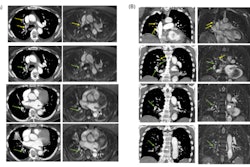Using an AI-based prioritization algorithm with CT chest pulmonary angiography (CTPA) to diagnose acute pulmonary embolism could enhance patient care by getting imaging results to clinicians more quickly, according to research shared at the recent RSNA meeting.
"Given that PE is a highly time-sensitive condition, [the time reductions our study showed] may potentially have a positive impact on reducing mortality and morbidity associated with [PE]," Ali Nabipoor, MD, of the University of Washington in Seattle told session attendees.
AI-based triage and prioritization algorithms use machine learning to analyze CTPA images, and can improve how patients with PE are managed by providing quicker and more accurate assessments, the investigators explained. This improved efficiency can enhance patient outcomes by allowing for timely treatment and better use of healthcare resources.
Nabipoor and colleagues tested the efficacy of an AI algorithm used for this indication via a study that analyzed 4,217 CTPA imaging exams performed on patients undergoing PE assessment between September 2023 and March 2024. Of this total, 325 PE-positive exams were procured before the use of the algorithm and 157 PE-positive exams were procured after it was implemented. The researchers used radiology reports and patient charts to track the time interval between the finalization of the CTPA scans and communication with clinical teams (i.e., notification time) and the time taken to initiate anticoagulation treatment (i.e., time to anticoagulation).
The group found the following:
| Performance of AI algorithm to improve pulmonary embolism diagnosis and treatment initiation times* | ||
|---|---|---|
| Measure | Pre-AI implementation | Post-AI implementation |
| Notification time | 64.4 minutes | 33.5 minutes |
| Mean time to anticoagulation treatment | 248 minutes | 149.2 minutes |
| *All results statistically significant | ||
"These findings highlight the potential of AI to streamline diagnostic processes and expedite clinical responses, contributing to improved patient management and outcomes," Nabipoor said.
He noted that he and his colleagues plan to continue their research by evaluating PE complications (such as right ventricular dysfunction or failure, shock and collapse, and stroke) both with and without the use of the AI algorithm.




















